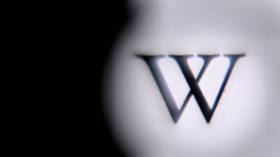
The online encyclopedia is a hotbed of misinformation, the chair of the Presidential Human Rights Council has said

© Nikolas Kokovlis/NurPhoto via Getty Images
Wikipedia is a “politically biased” platform and should eventually be banned in Russia, Valery Fadeev, the head of the Presidential Human Rights Council (HRC), has said. The Kremlin, however, cautioned that any talk about blocking the website is premature, as there is currently no adequate alternative.
Speaking at a press conference on Tuesday, Fadeev said Wikipedia “should be closed.” While the website is a convenient platform for receiving all sorts of information, he said, there are also “a lot of distortions when it comes to politics, history.”
Fadeev stressed that he is not insisting that the Russian authorities ban the portal right away, but rather only after a viable alternative is launched.
Igor Ashmanov, an HRC member, supported this idea, saying that Moscow has no tools to influence Wikipedia. “This is a strategic weapon. We should create equivalents and block it.”

Read more
Commenting on Fadeev’s remarks, Kremlin Press Secretary Dmitry Peskov agreed that the platform contains “a lot of distortions, a lot of lies, a lot of historical and factual mistakes.” However, he said that before closing it, Russia should create a replacement, which could offer “truly well-verified and accurate information.”
Since the start of the Ukraine conflict more than one year ago, the Russian authorities have accused Wikipedia of spreading “fake information” about Moscow’s military campaign in the neighboring country, and pressed the platform to remove materials – demands which were ignored. After this, Russia’s media watchdog, Roskomnadzor, required search engines to designate Wikipedia as an entity that “violates Russian law.”
In August 2022, Anton Gorelkin, the deputy head of the State Duma committee on information policy, announced the launch of a localized version of Wikipedia called Runiversalis, which he said would comply with the nation’s laws, be stored on servers in Russia, and be administered by a team of former Wikipedia editors.
At the time, Gorelkin said that the project’s authors were replicating Wikipedia’s articles, but clearing them of “propaganda and harmful content.”




